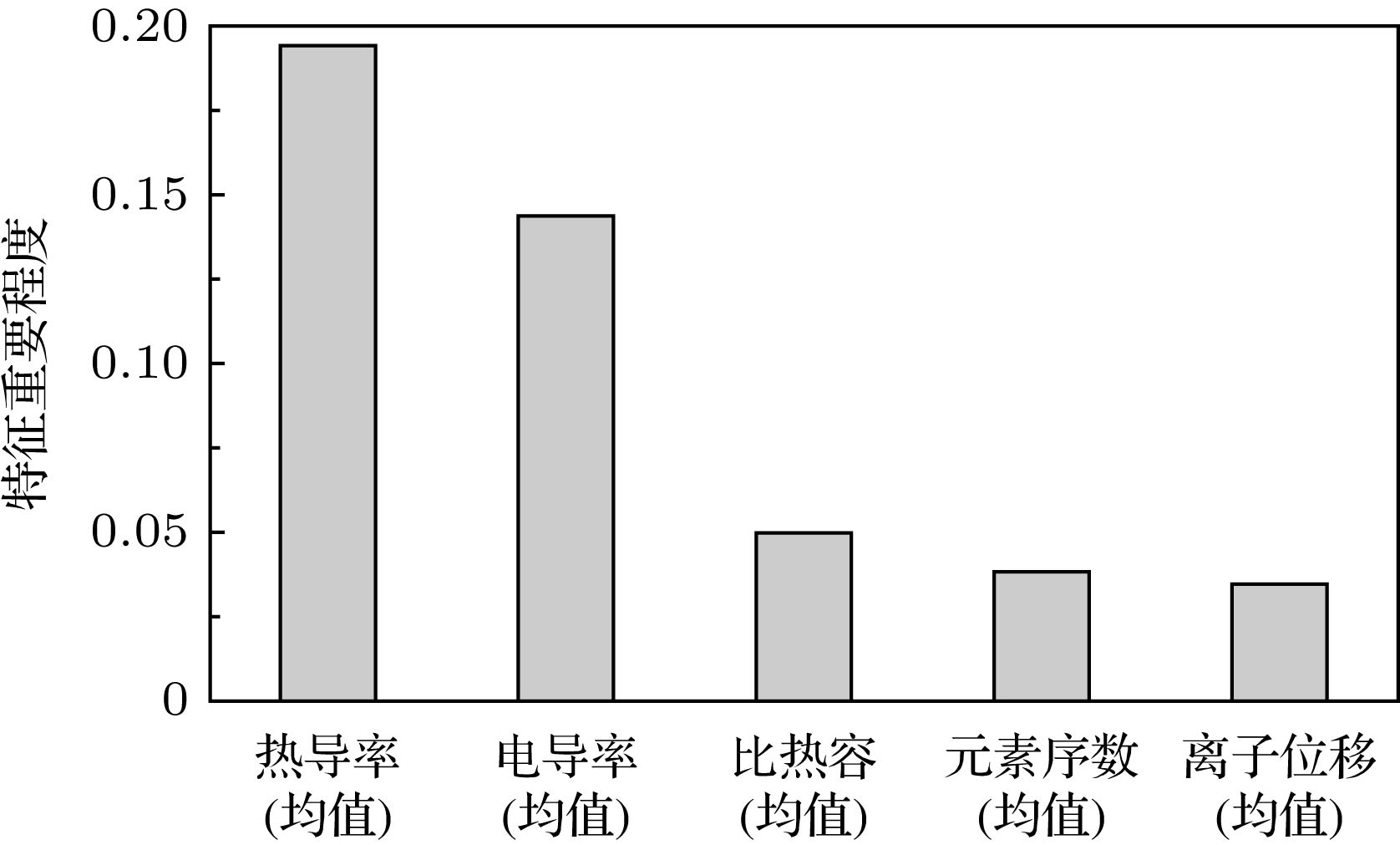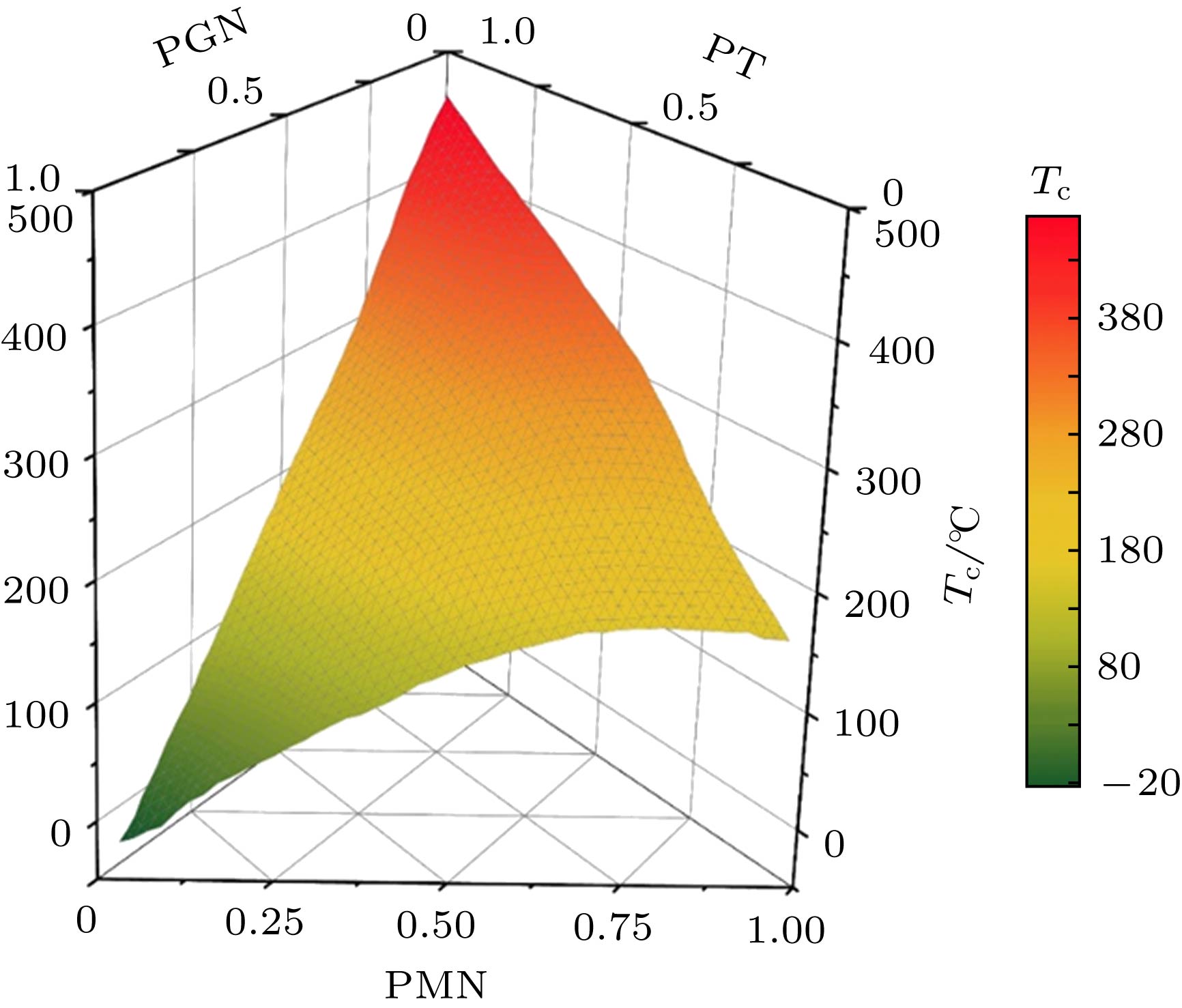-
铁电材料由铁电相转化为顺电相的临界温度被称为居里温度, 是铁电材料的一个关键指标. 本文使用固溶体组成元素的基本物理性质等特征对不同组分和配比的铅基钙钛矿铁电固溶体进行了统一的描述, 采用岭回归、支持向量回归、极端随机森林回归等机器学习方法对铅基钙钛矿铁电固溶体的居里温度进行了学习. 使用交叉验证的方法对学习效果进行验证, 得到上述机器学习方法对材料居里温度的预测值与实验值之间的平均误差分别为14.4, 14.7, 16.1 K, 集成三种回归方法优化的模型在交叉验证中测得的平均误差为13.9 K. 在此基础上对超过20万种铅基钙钛矿的居里温度进行了预测, 给出了两种可能具有高居里温度的铁电材料.Ferroelectrics undergoes a reversible structural phase from the ferroelectric phase to the paraelectric phase when its temperature exceeds the critical temperature namely Curie temperature Tc. As ferro-paraelectric phase transition is always accompanied by heat-flow, dielectric and pyroelectric anomaly, the value of Tc is extremely important for ferroelectrics. In this paper, the Curie temperature of lead-based perovskite ferroelectric solid solution is studied by machine learning methods including kernel ridge regression (KRR), support vector regression (SVR) and extremely randomized trees regression (ETR). We collect the Tc values of 205 different lead-based perovskites from published experimental papers, both simple perovskites with only one type of B site ion and complex perovskites with up to 5 kinds of ions in B position such as PMN-PFN-PZT are gathered. The diversity of our dataset is guaranteed for the good generalization of our model in perovskite solid solution of different complexity. The features are constructed from the physical and chemical properties of the B site elements in corresponding materials. The weighted-average and variance of the elemental properties are calculated and fed to machine learning models. We use the 5 runs of ten fold cross-validation method to evaluate the machine learning models. The hyperparameters are also chosen carefully with the cross-validation to avoid over fitting. The radial basis function kernel is used in both KRR and SVR. The insensitive error in the SVR is set to be 4 which is comparable to the random error in experiment. From our cross-validation, we find that the mean average errors (MAEs) between the predicted and experimental values of the machine learning methods are 14.4 K, 14.7 K, and 16.1 K, respectively. And the root-mean-square errors (RMSEs) are 22.5 K, 23.4 K, 23.8 K, respectively. After the optimization and the evaluation, our three machine learning models are stacked together by averaging the output of each regression model and thus building an ensemble model. The MAE of the ensemble model is 13.9 K. The RMSE of the ensemble model is 21.4 K. The predicted values keep a correlation coefficient of 0.97 with the experimental values. From the variance reduction in ETR, we derive the importance of our features when determining the Curie temperatures. The five most important factors in our ETR model are " weighted-average thermal conductivity”, " weighted-average conductivity”, " variance of specific heat capacity”, " weighted-average element number”, and " weighted-average relative atomic displacement”. We predict the Curie temperatures higher than those of 200000 types of lead-based perovskites after being trained. Now, we provide two ferroelectric materials that may have high Curie temperatures: 0.02PbMn1/2Nb1/2O3-0.98PbTiO3 (0.02PMN-0.98PT) and 0.02PbGa1/2Nb1/2-0.02PbMn1/2Nb1/2O3-0.96PbTiO3 (0.02PGN-0.02PMN-0.96PT). The predicted Curie temperatures of them are 481 ℃ and 466 ℃, respectively.
-
Keywords:
- machine learning /
- ferroelectric /
- Curie temperature /
- perovskite
[1] Liu Y, Li X, Wang Z, He C, Li T, Ai L, Chu T, Pang D, Long X 2013 CrystEngComm 15 1643
 Google Scholar
Google Scholar
[2] Wu J, Chang Y, Yang B, Zhang S, Sun Y, Guo F, Cao W 2015 J. Mater. Sci.: Mater. Electron 26 1874
 Google Scholar
Google Scholar
[3] Zhao Y Q, Ma Q R, Liu B, Yu Z L, Yang J, Cai M Q 2018 Nanoscale 10 8677
 Google Scholar
Google Scholar
[4] Ding Y F, Zhao Q Q, Yu Z L, Zhao Y Q, Liu B, He P B, Zhou H, Li K, Yin S F, Cai M Q 2019 J. Mater. Chem. C 7 7433
 Google Scholar
Google Scholar
[5] Yu Z L, Ma Q R, Liu B, Zhao Y Q, Wang L Z, Zhou H, Cai M Q 2017 J. Phys. D 50 465101
 Google Scholar
Google Scholar
[6] Zhang T, Jiang Y, Song Z, Huang H, He Y, Fang Z, Weng H, Fang C 2019 Nature 566 475
 Google Scholar
Google Scholar
[7] Umehara M, Stein H S, Guevarra D, Newhouse P F, Boyd D A, Gregoire J M 2019 NPJ Comput. Mater. 5 34
 Google Scholar
Google Scholar
[8] Iwasaki Y, Takeuchi I, Stanev V, et al. 2019 Sci. Rep. 9 2751
 Google Scholar
Google Scholar
[9] Aykol M, Hegde V I, Hung L, Suram S, Herring P, Wolverton C, Hummelshøj J S 2019 Nat. Commun 10 1
 Google Scholar
Google Scholar
[10] Balachandran P V, Kowalski B, Sehirlioglu A, Lookman T 2018 Nat. Commun. 9 1668
 Google Scholar
Google Scholar
[11] Zhai X, Chen M, Lu W 2018 Comput. Mater. Sci. 151 41
 Google Scholar
Google Scholar
[12] Pedregosa F, Varoquaux G, Gramfort A, Michel V, Thirion B, Grisel O, Blondel M, Prettenhofer P, Weiss R, Dubourg V, Vanderplas J, Passos A, Cournapeau D, Brucher M, Perrot M, Duchesnay É 2011 J. Mach. Learn. Res. 12 2825
[13] Chen H, Fan C 2010 Mater. Lett. 64 654
 Google Scholar
Google Scholar
[14] Fang B, Shan Y, Tezuka K, Imoto H 2005 J. Mater. Sci. 40 6445
 Google Scholar
Google Scholar
[15] Gao Y Q, Xu H Q, Wu Y J, He T H, Xu G S, Luo H S 2001 Jpn. J. Appl. Phys. 40 4998
 Google Scholar
Google Scholar
[16] Guo Y P, Xu H Q, Luo H S, Xu G S, Yin Z W 2001 J. Cryst. Growth 226 111
 Google Scholar
Google Scholar
[17] Hao H, Zhang S, Liu H, Shrout T R 2009 J. Appl. Phys. 105 024104
 Google Scholar
Google Scholar
[18] He C, Li X, Wang Z, Liu Y, Shen D, Li T, Long X, Ye Z G 2012 CrystEngComm 14 4407
 Google Scholar
Google Scholar
[19] Wang L, Liang R, Mao C, Du G, Wang G, Dong X 2013 Ceram. Int. 39 8571
 Google Scholar
Google Scholar
[20] Yasuda N, Ohwa H, Hasegawa D, Hayashi K, Hosono Y, Yamashita Y, Iwata M, Ishibashi Y 2000 Jpn. J. Appl. Phys. 39 5586
 Google Scholar
Google Scholar
[21] Zhang S, Lebrun L, Jeong D Y, Randall C A, Zhang Q, Shrout T R 2003 J. Appl. Phys. 93 9257
 Google Scholar
Google Scholar
[22] Bing Y, Ye Z 2002 Proceedings of the 13th IEEE International Symposium on Applications of Ferroelectrics, Nara, Japan, June 1, 2002 pp447−450
[23] Li X, Wang Z, He C, Liu Y, Long X, Han S, Pan S 2015 Mater. Lett. 143 88
 Google Scholar
Google Scholar
[24] Rajan K K, Zhang M J, Lim L C 2005 Jpn. J. Appl. Phys. 44 264
 Google Scholar
Google Scholar
[25] Salak A N, Shilin A D, Bushinski M V, Olekhnovich N M, Vyshatko N P 2000 Mater. Res. Bull. 35 1429
 Google Scholar
Google Scholar
[26] Salak A N, Vyshatko N P, Ferreira V M, Olekhnovich N M, Shilin A D 2003 Mater. Res. Bull. 38 453
 Google Scholar
Google Scholar
[27] Yamashita Y, Harada K 1997 Jpn J. Appl. Phys. 36 6039
 Google Scholar
Google Scholar
[28] Wang J, Tang X G, Chan H L W, Choy C L, Luo H 2005 Appl. Phys. Lett. 86 152907
 Google Scholar
Google Scholar
[29] Grinberg I, Rappe A M 2007 Phase Trans. 80 351
 Google Scholar
Google Scholar
[30] Balachandran P V, Shearman T, Theiler J, Lookman T 2017 Acta Crystallogr. Sect. B 73 962
 Google Scholar
Google Scholar
[31] 周志华 2016 机器学习 (北京: 清华大学出版社) 第133−137页
Zhou Z H 2016 Machine Learning (Beijing: Tsinghua Univer-sity Press) pp133−137 (in Chinese)
[32] Geurts P, Ernst D, Wehenkel L 2006 Machine Learning 63 3
 Google Scholar
Google Scholar
[33] Hoerl A E, Kennard R W 1970 Technometrics 12 55
 Google Scholar
Google Scholar
[34] Welling M https://www.ics.uci.edu/~welling/classnotes/papers _class/Kernel-Ridge.pdf [2019-6-7]
[35] Lin C J https://www.csie.ntu.edu.tw/~cjlin/talks/kuleuven_svm.pdf [2019-6-7]
[36] Bergstra J, Bengio Y 2012 J. Mach. Learn. Res. 13 281
[37] Louppe G, Wehenkel L, Sutera A, Geurts P 2013 Under-standing Variable Importances in Forests of Randomized Trees (Advances in Neural Information Processing Systems) pp431−439
-
表 1 本文三种机器学习方法所采用的超参数
Table 1. Hyperparameters of the three machine learning methods in this study.
模型 超参数 KRR $\lambda $ = 0.001, $\gamma $ = 0.005 SVR $\gamma $ = 0.02, ε = 4, C = 900 ETR n = 108, depth = 20, min_samples = 2 表 2 本文所使用的机器学习方法的评估及与其他研究者工作的对比
Table 2. Evaluation of machine learning methods in this paper and the comparison with other works.
-
[1] Liu Y, Li X, Wang Z, He C, Li T, Ai L, Chu T, Pang D, Long X 2013 CrystEngComm 15 1643
 Google Scholar
Google Scholar
[2] Wu J, Chang Y, Yang B, Zhang S, Sun Y, Guo F, Cao W 2015 J. Mater. Sci.: Mater. Electron 26 1874
 Google Scholar
Google Scholar
[3] Zhao Y Q, Ma Q R, Liu B, Yu Z L, Yang J, Cai M Q 2018 Nanoscale 10 8677
 Google Scholar
Google Scholar
[4] Ding Y F, Zhao Q Q, Yu Z L, Zhao Y Q, Liu B, He P B, Zhou H, Li K, Yin S F, Cai M Q 2019 J. Mater. Chem. C 7 7433
 Google Scholar
Google Scholar
[5] Yu Z L, Ma Q R, Liu B, Zhao Y Q, Wang L Z, Zhou H, Cai M Q 2017 J. Phys. D 50 465101
 Google Scholar
Google Scholar
[6] Zhang T, Jiang Y, Song Z, Huang H, He Y, Fang Z, Weng H, Fang C 2019 Nature 566 475
 Google Scholar
Google Scholar
[7] Umehara M, Stein H S, Guevarra D, Newhouse P F, Boyd D A, Gregoire J M 2019 NPJ Comput. Mater. 5 34
 Google Scholar
Google Scholar
[8] Iwasaki Y, Takeuchi I, Stanev V, et al. 2019 Sci. Rep. 9 2751
 Google Scholar
Google Scholar
[9] Aykol M, Hegde V I, Hung L, Suram S, Herring P, Wolverton C, Hummelshøj J S 2019 Nat. Commun 10 1
 Google Scholar
Google Scholar
[10] Balachandran P V, Kowalski B, Sehirlioglu A, Lookman T 2018 Nat. Commun. 9 1668
 Google Scholar
Google Scholar
[11] Zhai X, Chen M, Lu W 2018 Comput. Mater. Sci. 151 41
 Google Scholar
Google Scholar
[12] Pedregosa F, Varoquaux G, Gramfort A, Michel V, Thirion B, Grisel O, Blondel M, Prettenhofer P, Weiss R, Dubourg V, Vanderplas J, Passos A, Cournapeau D, Brucher M, Perrot M, Duchesnay É 2011 J. Mach. Learn. Res. 12 2825
[13] Chen H, Fan C 2010 Mater. Lett. 64 654
 Google Scholar
Google Scholar
[14] Fang B, Shan Y, Tezuka K, Imoto H 2005 J. Mater. Sci. 40 6445
 Google Scholar
Google Scholar
[15] Gao Y Q, Xu H Q, Wu Y J, He T H, Xu G S, Luo H S 2001 Jpn. J. Appl. Phys. 40 4998
 Google Scholar
Google Scholar
[16] Guo Y P, Xu H Q, Luo H S, Xu G S, Yin Z W 2001 J. Cryst. Growth 226 111
 Google Scholar
Google Scholar
[17] Hao H, Zhang S, Liu H, Shrout T R 2009 J. Appl. Phys. 105 024104
 Google Scholar
Google Scholar
[18] He C, Li X, Wang Z, Liu Y, Shen D, Li T, Long X, Ye Z G 2012 CrystEngComm 14 4407
 Google Scholar
Google Scholar
[19] Wang L, Liang R, Mao C, Du G, Wang G, Dong X 2013 Ceram. Int. 39 8571
 Google Scholar
Google Scholar
[20] Yasuda N, Ohwa H, Hasegawa D, Hayashi K, Hosono Y, Yamashita Y, Iwata M, Ishibashi Y 2000 Jpn. J. Appl. Phys. 39 5586
 Google Scholar
Google Scholar
[21] Zhang S, Lebrun L, Jeong D Y, Randall C A, Zhang Q, Shrout T R 2003 J. Appl. Phys. 93 9257
 Google Scholar
Google Scholar
[22] Bing Y, Ye Z 2002 Proceedings of the 13th IEEE International Symposium on Applications of Ferroelectrics, Nara, Japan, June 1, 2002 pp447−450
[23] Li X, Wang Z, He C, Liu Y, Long X, Han S, Pan S 2015 Mater. Lett. 143 88
 Google Scholar
Google Scholar
[24] Rajan K K, Zhang M J, Lim L C 2005 Jpn. J. Appl. Phys. 44 264
 Google Scholar
Google Scholar
[25] Salak A N, Shilin A D, Bushinski M V, Olekhnovich N M, Vyshatko N P 2000 Mater. Res. Bull. 35 1429
 Google Scholar
Google Scholar
[26] Salak A N, Vyshatko N P, Ferreira V M, Olekhnovich N M, Shilin A D 2003 Mater. Res. Bull. 38 453
 Google Scholar
Google Scholar
[27] Yamashita Y, Harada K 1997 Jpn J. Appl. Phys. 36 6039
 Google Scholar
Google Scholar
[28] Wang J, Tang X G, Chan H L W, Choy C L, Luo H 2005 Appl. Phys. Lett. 86 152907
 Google Scholar
Google Scholar
[29] Grinberg I, Rappe A M 2007 Phase Trans. 80 351
 Google Scholar
Google Scholar
[30] Balachandran P V, Shearman T, Theiler J, Lookman T 2017 Acta Crystallogr. Sect. B 73 962
 Google Scholar
Google Scholar
[31] 周志华 2016 机器学习 (北京: 清华大学出版社) 第133−137页
Zhou Z H 2016 Machine Learning (Beijing: Tsinghua Univer-sity Press) pp133−137 (in Chinese)
[32] Geurts P, Ernst D, Wehenkel L 2006 Machine Learning 63 3
 Google Scholar
Google Scholar
[33] Hoerl A E, Kennard R W 1970 Technometrics 12 55
 Google Scholar
Google Scholar
[34] Welling M https://www.ics.uci.edu/~welling/classnotes/papers _class/Kernel-Ridge.pdf [2019-6-7]
[35] Lin C J https://www.csie.ntu.edu.tw/~cjlin/talks/kuleuven_svm.pdf [2019-6-7]
[36] Bergstra J, Bengio Y 2012 J. Mach. Learn. Res. 13 281
[37] Louppe G, Wehenkel L, Sutera A, Geurts P 2013 Under-standing Variable Importances in Forests of Randomized Trees (Advances in Neural Information Processing Systems) pp431−439
计量
- 文章访问数: 14696
- PDF下载量: 279
- 被引次数: 0
















 下载:
下载:




